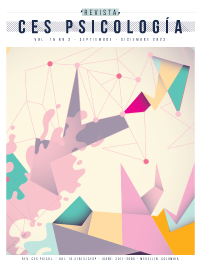Religión, gratitud y comportamiento prosocial: un modelo predictivo
DOI:
https://doi.org/10.21615/cesp.6669Palavras-chave:
comportamento pró-social, religião, gratidãoResumo
Muitas religiões consideram o comportamento pró-social como um dever de seus seguidores. O objetivo deste estudo foi determinar a influência da religião e da gratidão no comportamento pró-social. Metodologia quantitativa, desenho transversal e amostra de conveniência de 206 adultos (Chile). Foram aplicadas escalas de religiosidade, gratidão e prossocialidade. Os dados foram analisados com base no qui-quadrado, correlação de Spearman, diferença média e regressão linear. Diferenças foram encontradas no comportamento pró-social, dependendo da religiosidade e da gratidão para com um deus. Além disso, prossocialidade, religião e gratidão se correlacionam positivamente e essas duas últimas variáveis são preditoras de prossocialidade. Na discussão, os resultados são analisados à luz da literatura.
Downloads
Referências
Algoe, S. B., Haidt, J., & Gable, S. L. (2008). Beyond reciprocity: Gratitude and relationships in everyday life. Emotion, 8, 425-429. https://doi.org/10.1037/1528-3542.8.3.425
Aghababaei, N., Błachnio, A., & Aminikhoo, B. (2018). The relations of gratitude to religiosity, well-being, and personality. Mental Health, Religion & Culture, 21(4), 408-417. https://doi.org/10.1080/13674676.2018.1504904
Bulbulia, J., & Mahoney, A. (2008). Religious solidarity: The hand grenade experiment. Journal of Cognition and Culture, 8, 295–320. http://doi.org/10.1163/156853708X358191
Caprara, G. V., Steca, P., Zelli, A., & Capanna, C. (2005). A new scale for measuring adults' prosocialness. European Journal of Psychological Assessment, 21(2), 77-89. https://doi.org/10.1027/1015-5759.21.2.77
Carmona, M.A., Marín, M., & Belmar, F. (2015). Análisis psicométrico del Gratitude Questionnaire 6 (GQ-6) en población chilena. Universitas Psychologica, 14(3), 881-888. http://dx.doi.org/10.11144/Javeriana.upsy14-3.apgq
Coma, J., & Carbonell, J. (2015). Experiencia de libre albedrío en la conducta pro-social determinada por la alegría. Escritos de Psicología 8(3), 41–47. https://dx.doi.org/10.5231/psy.writ.2015.3007.
Cuadra, D., Sandoval, J., Pérez, D., Castro, P., Véliz, D., Guzmán, J., & Ramos, G. (2019). Helping one’s neighbor: Teaching and learning prosocial behavior in a religious community. Religions, 10(9), 1-17. https://doi.org/10.3390/rel10090515
Einolf, C. J. (2013). Daily spiritual experiences and prosocial behavior. Social Indicators Research, 110, 71-87. http://doi.org/10.1007/s11205-011-9917-3
Einolf, C. J. (2017). Cross-national differences in charitable giving in the west and the world. Voluntas: International Journal of Voluntary and Nonprofit Organizations, 28, 472–491. http://dx.doi.org/10.1007/s11266-016-9758-4
Grant, A. M., & Gino, F. (2010). A little thanks goes a long way: Explaining why gratitude expressions motivate prosocial behavior. Journal of Personality and Social Psychology, 98(6), 946–955. https://doi.org/10.1037/a0017935
Grossman, P. J., & Parrett, M. B. (2011). Religion and prosocial behaviour: A field test. Applied Economics Letters, 18, 523–526. https://doi.org/10.1080/13504851003761798
Gulliford, L., Morgan, B., Hemming, E. &, Abbott, J. (2019). Gratitude, self-monitoring and social intelligence: A prosocial relationship? Current Psychology, 38, 1021-1032. http://doi.org/10.1007/s12144-019-00330-w
Guo, Q., Liu, Z., & Tian, Q. (2018). Religiosity and prosocial behavior at national level. Psychology of Religion and Spirituality, 10, 1-11. https://doi.org/10.1037/rel0000171
Hepach, R., Vaish, A., Grossmann, T., & Tomasello, M. (2016). Young children want to see others get the help they need. Child Development, 87, 1703-14. https://doi.org/10.1111/cdev.12633
Iannello, N. M., Hardy, S. A., Musso, P., Lo Coco, A., & Inguglia, C. (2019). Spirituality and ethnocultural empathy among Italian adolescents: the mediating role of religious identity formation processes. Psychology of Religion and Spirituality, 11, 32-41. https://doi.org/10.1037/rel0000155
Ives, C., & kidwell, J. (2019). Religion and social values for sustainability. Sustainability Science, 14(5), 1355-1362. https://doi.org/10.1007/s11625-019-00657-0
Jin, S., Balliet, D., Romano, A., Spadaro, G., van Lissa, C., Agostini, M., Bélanger, J., Gützkwon, B., & Kreienkamp, J. (2021). Intergenerational conflicts of interest and prosocial behavior during the COVID-19 pandemic. Personality and Individual Differences, 171, 1-8. https://doi.org/10.1016/j.paid.2020.110535
Johansson-Stenman, O., Mahmud, M., & Martinsson, P. (2006). Trust and religion: Experimental evidence from Bangladesh. Centre for Economic Research, Keele University, Newcastle-under-Lyme, Staffordshire, England. http://econpapers.repec.org/RePEc:kee:kerpuk:2006/10
Johnson, M. K., Rowatt, W. C., & LaBouff, J. (2010). Priming Christian religious concepts increases racial prejudice. Social Psychological and Personality Science, 1, 119–126. http://doi.org/10.1177/1948550609357246
Johnson, K. A., Cohen, A. B., & Okun, M. A. (2016). God is watching you… but also watching over you: The influence of benevolent God representations on secular volunteerism among Christians. Psychology of Religion and Spirituality, 8, 363–374. http://dx.doi.org/10.1037/rel0000040
Kline, R. B. (2016). Principles and practice of structural equation modeling (4.a ed.). New York: Guilford.
Kline, R., Bankert, A., Levitan, L., & Kraft, P. (2019). Personality and Prosocial Behavior: A Multilevel Meta-Analysis. Political Science Research and Methods, 7(1), 125-142. http://doi.org/10.1017/psrm.2017.14
Knafo-Noam, A., Uzefovsky, F., Israel, S., Davidov, M., & Zahn-Waxler, C. (2019). The prosocial personality and its facets: genetic and environmental architecture of mother-reported behavior of 7-year-old twins. Frontiers in Psychology, 6(112), 1-9. Doi: http://doi.org/10.3389/fpsyg.2015.00112
Kruse, E., Chancellor, J., Ruberton, P. M., & Lyubomirsky, S. (2014). An upward spiral between gratitude and humility. Social Psychological and Personality Science, 5(7), 805–814. https://doi.org/10.1177/1948550614534700
Lay, J., & Hoppmann, C. (2015). Altruism and prosocial behavior. Encyclopedia of Geropsychology, 69, 1-9. https://doi.org/10.1007/978-981-287-080-3_69-1
Li, J-J., Dou, K., Wang, Y-J., & Nie, Y-G. (2019). Why awe promotes prosocial behaviors? The mediating effects of future time perspective and self-transcendence meaning of life. Frontiers in Psychology. 10(1140), 1-9. http://doi.org/10.3389/fpsyg.2019.01140
McCullough, M. E., Emmons, R. A., & Tsang, J. A. (2002). The grateful disposition: A conceptual and empirical topography. Journal of Personality and Social Psychology, 82, 112-127. http://doi.org/10.1037//0022-3514.82.1.112
Maltby, J. (2002). The Age Universal I-E Scale-12 and orientation toward religion: Confirmatory factor analysis. The Journal of Psychology, 136, 555-560. http://doi.org/10.1080/00223980209605550
Mieres-Chacaltana, M., Salvo-Garrido, S., Denegri, M., & Riquelme-Zavalla, R. (2019). Prosocialidad y bienestar subjetivo en estudiantes de pedagogía en educación física. Journal of Sport and Health Research, 11(Supl 2), 63-74. https://recyt.fecyt.es/index.php/JSHR/article/view/80949
Morgan, B., Gulliford, L., & Kristjánsson, K. (2017). A new approach to examining moral virtue: The multi-component gratitude measure. Personality and Individual Differences, 107, 179-189. http://doi.org/10.1016/j.paid.2016.11.044
Moya-Albiol, L., Herrero, N., & Bernal, M.C. (2010). Bases neuronales de la empatía. Revista de Neurología 50, 89-100. https://doi.org/10.33588/rn.5002.2009111
Pew Research Centre. (2017) The changing global religious landscape. http://www.pewforum.org/2017/04/05/the-changing-global-religious-landscape/
Power, E. A. (2017). Discerning devotion: Testing the signaling theory of religion. Evolution and Human Behavior, 38, 82–91. http://dx.doi.org/10.1016/j.evolhumbehav.2016.07.003
Preston, J. L., & Ritter, R. S. (2013). Different effects of religion and God on prosociality with the ingroup and outgroup. Personality and Social Psychology Bulletin, 39, 1471–1483. http://dx.doi.org/10.1177/0146167213499937
Ritter, R. S., & Preston, J. L. (2013). Representations of religious words: Insights for religious priming research. Journal for the Scientific Study of Religion, 52(3), 494-507. http://doi.org/10.1111/jssr.12042
Ruiter, S., & De Graaf, N. D. (2006). National context, religiosity, and volunteering: Results from 53 countries. American Sociological Review, 71, 191–210. http://dx.doi.org/10.1177/000312240607100202
Saroglou, V. (2013). Religion, spirituality, and altruism. In K. I. Pargament, J. Exline, & J. Jones (Eds.), APA handbook of psychology, religion, and spirituality (Vol. 1, pp. 439–457). American Psychological Association. https://doi.org/10.1037/14045-024
Shariff, A. F., Willard, A. K., Andersen, T., & Norenzayan, A. (2016). Religious priming: A meta-analysis with a focus on prosociality. Personality and Social Psychology Review, 20(1), 27–48. https://doi.org/10.1177/1088868314568811
Simkin, H., & Etchezahar, E. (2013). Las orientaciones religiosas extrínseca e intrínseca: validación de la “Age Universal” I-E Scale en el contexto argentino. Psykhe, 22(1), 97-106. http://doi.org/10.7764/psykhe.22.1.477
Son, D., & Padilla-Walker, L. (2019). Happy helpers: A multidimensional and mixed-method approach to prosocial behavior and its effects on friendship quality, mental health, and well‑being during adolescence. Journal of Hajavippiness Studies, 21, 1-19. https://doi.org/10.1007/s10902-019-00154-2
Spinrad, T., & Eisenberg, N. (2019). Prosocial emotions. In: LoBue V., Pérez-Edgar K., Buss K. (eds), Handbook of Emotional Development (pp. 351-372). Springer, Cham. Doi: https://doi.org/10.1007/978-3-030-17332-6_14
Stiff, C., Rosenthal-Stott, H., Wake, S., & Woodward, A. (2019). Student pro-sociality: Measuring institutional and individual factors that predict pro-social behaviour at university. Curr Psychol, 38(4), 920-930. https://doi.org/10.1007/s12144-019-00256-3
Tiliopoulos, N., Bikker, A. P., Coxon, A. P. M., & Hawkin, P. K. (2007). The means and ends of religiosity: A fresh look at Gordon Allport’s religious orientation dimensions. Personality and Individual Differences, 42, 1609–1620. http://doi.org/10.1016/j.paid.2006.10.034
Tsang, J., & Stephen, M. (2017). Four experiments on the relational dynamics and prosocial consequences of gratitude. The Journal of Positive Psychology 14(3), 1-18. http://doi.org/10.1080/17439760.2017.1388435
Tudor, B. (2015). Appreciating the positive protects us from negative emotions: The relationship between gratitude, depression and religiosity. Procedia - Social and Behavioral Sciences, 187, 475-480. http://doi.org/10.1016/j.sbspro.2015.03.089
Universidad Católica (2019). Encuesta Nacional Bicentenario 2019. Pontificia Universidad Católica de Chile, Chile.
Wood, A. M., Joseph, S., Lloyd, J., & Atkins, S. (2009). Gratitude influences sleep through the mechanism of pre-sleep cognitions. Journal of Psychosomatic Research, 66(1), 43–48. https://doi.org/10.1016/j.jpsychores.2008.09.002
Xiao, S. X., Spinrad, T. L., & Eisenberg, N. (2019). Longitudinal relations of preschoolers’ dispositional and situational anger to their prosocial behavior: The moderating role of shyness. Social Development, 28(2), 383-397. https://doi.org/10.1111/sode.12346
Xygalatas, D., Klocová, E. K., Cigán, J., Kundt, R., Maňo, P., Kotherová, S., Mitkidis, P., Wallot, S., & Kanovsky, M. (2016). Location, location, location: Effects of cross-religious primes on prosocial behavior. International Journal for the Psychology of Religion, 26, 304–319. https://doi.org/10.1080/10508619.2015.1097287
Downloads
Publicado
Como Citar
Edição
Seção
Licença
Copyright (c) 2023 David Cuadra Martínez, Daniel Pérez Zapata, José Sandoval Díaz, Pablo Castro, Cristián Oyanadel, Diego Mora, Catalina Cuadra, Ingrid González

Este trabalho está licenciado sob uma licença Creative Commons Attribution-NonCommercial-ShareAlike 4.0 International License.
Revista CES Psicología ISSN 2011 3080
Facultad de Psicología, Universidad CES Primera edición 2008. Última actualización Mayo 29 de 2024. Todos los derechos reservados. Hecho el depósito legal que exige la ley.
Se autoriza la reproducción total o parcial de los artículos citando la fuente y el autor. This publication may be reproduced by mentioning the source and the authors.



